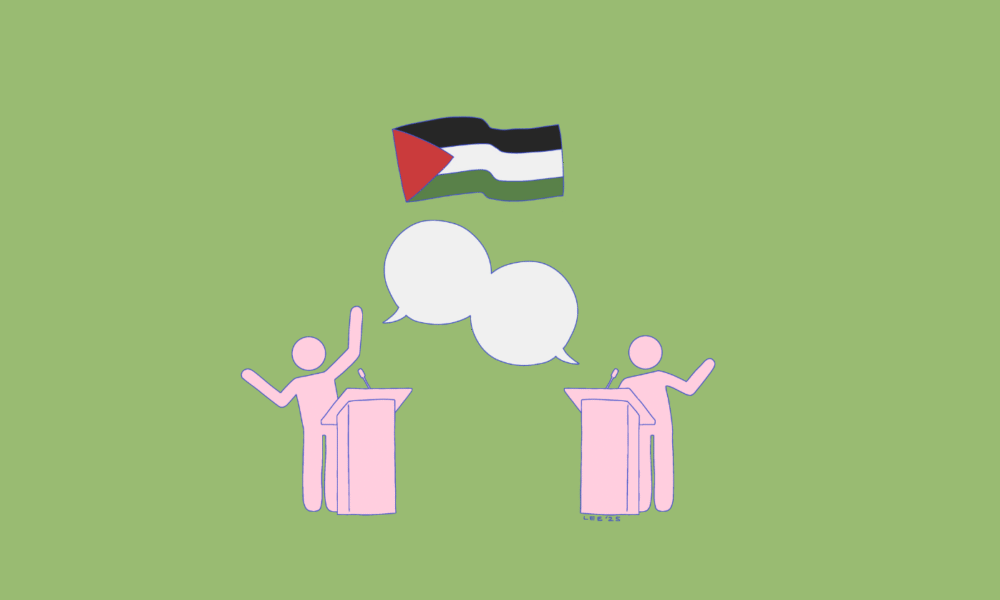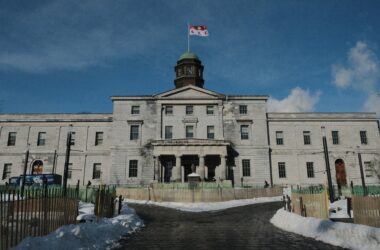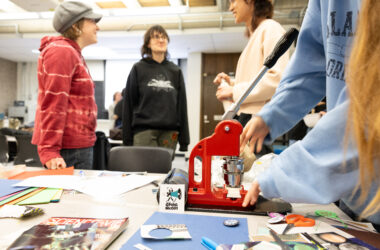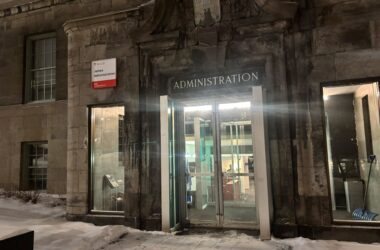On Oct. 27, the Students’ Society of McGill University (SSMU) hosted a debate in the University Centre Ballroom between representatives from four Montreal parties that competed in the municipal election: Ensemble Montréal, Futur Montréal, Projet Montréal, and Transition Montréal. Angela Campbell, professor in the Faculty of Law and Interim Deputy Provost of Student Life and Learning, moderated the debate. After significant disruption from protestors in the audience who called for Campbell to listen to their demands for McGill to divest from weapons manufacturers, the organizers decided to cancel the event.
SSMU Vice President (VP) External Seraphina Crema-Black, who organized the SSMU event, offered introductory remarks.
“Student democracy, and democracy in general, is really important. It’s something that we strive for at the SSMU,” she said.
Campbell then gave a land acknowledgement and began her introductory speech. She commented on the importance of engaging students in local democracy.
“This afternoon’s debate is an incredible opportunity for candidates to present themselves to the McGill student community, and to engage recommendations that matter the most to you as students,” she stated. “With over 200,000 post-secondary students here in Montreal, it’s essential that [student] voices are heard and reflected in the decisions that shape our city.”
During her statement, a student in the audience stood up and addressed Campbell, asking her to speak directly to the pro-Palestine protestors demanding divestment from genocide at McGill.
“How dare you sit on stage and plan to represent student democracy, while you continue to repress the demands of the student protesters calling for divestment from genocide?” they asked. “After two years of the genocide, you’re responsible for suspending pro-Palestine groups like [Students for Palestine’s Honour and Resistance] and pursuing legal action against your own students.”
The student’s remarks were followed by yelling from the crowd. Campbell responded that she “would be happy to discuss this further [with the protestors] after the debate.”
After the audience member finished speaking, Campbell began to explain the structure of the debate, which would begin with opening statements, followed by three pre-prepared questions for the candidates in English, and three questions in French. Another protestor from the audience then stood up to address Campbell, expressing that disciplinary action against pro-Palestine protestors is undemocratic.
Again, Campbell offered to speak with protestors in another room to allow the debate to continue. She then introduced Danso, the candidate from Transition Montréal for City Council from the district Peter-McGill. Danso began their speech by expressing solidarity with the protestors, before giving a prepared opening statement.
“I did witness police violence against protestors firsthand [at McGill],” Danso began. “We have the chance to change Montreal [….] We have seen the police budget increase from $600 to $800 million CAD in just the last five years, and that’s a reaction to the increased protests, which are themselves a reaction to the instability in society [….] Transition Montréal stands for community organizations, social housing, taxing the rich to pay for these things, and building a strong community.”
After this, another protestor from the audience asked Campbell about the termination of McGill’s Memorandum of Agreement with the SSMU, which she announced on behalf of the Board of Governors after the three-day student strike for Palestine in April 2025. The protestor referred to this as a “blatant attack on student democracy.”
For several minutes, Campbell repeatedly emphasized that this was a forum for the electoral candidates, and that they had a right to speak on the issues of the city for the sake of democracy. Protestors maintained that Campbell should answer their questions in the name of student democracy.
One protestor then claimed that the SSMU debate was illegitimate because the questions were pre-selected and students in the audience could not ask questions themselves. VP Crema-Black pushed back, explaining that no one had taken advantage of the public online form to submit questions for the candidates, so she had to write all six debate questions.
After this exchange, Campbell announced that the debate was cancelled. No other candidates spoke. Only Danso and Maryse Bouchard, Projet Montréal City Council candidate for Ville-Marie, stayed afterward to talk with students one-on-one.
A previous version of this article’s headline stated that Angela Campbell cancelled the SSMU-hosted municipal debate after protests from the audience. In fact, SSMU’s executive team decided to cancel the debate, which Campbell simply announced as the debate’s moderator. The Tribune regrets these errors.









